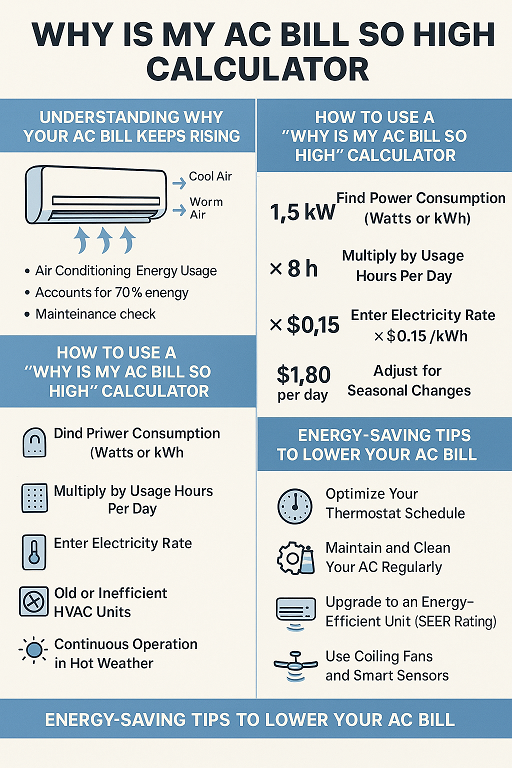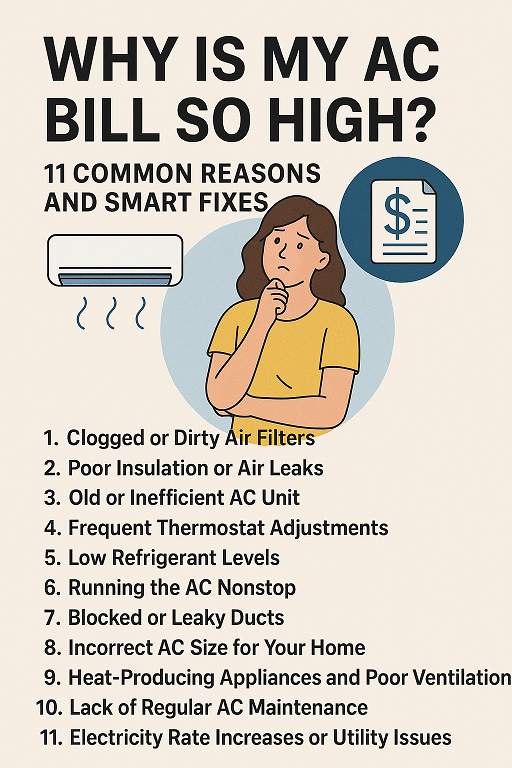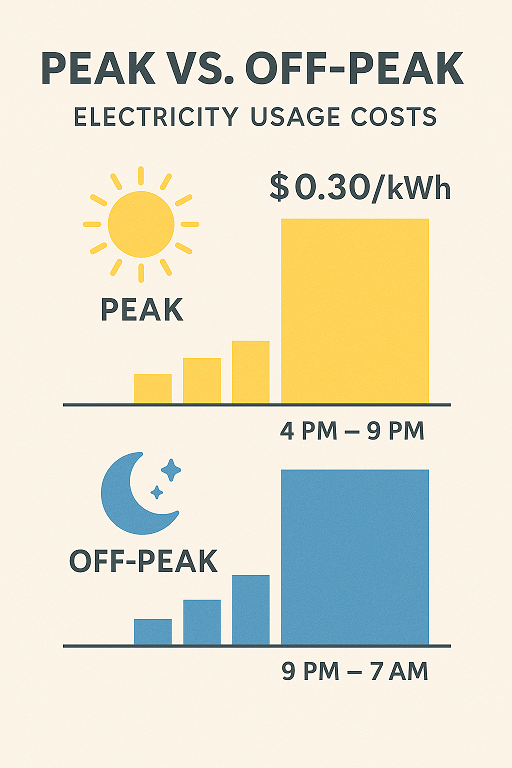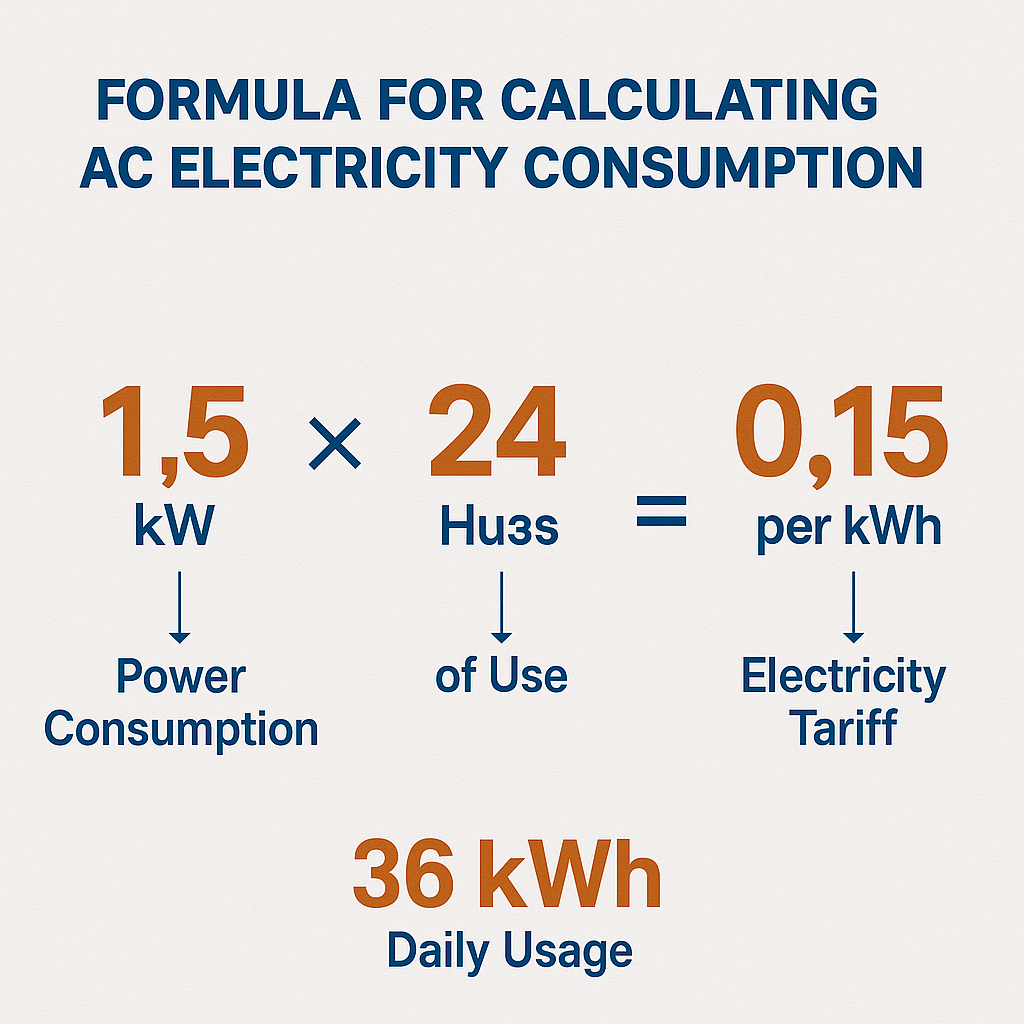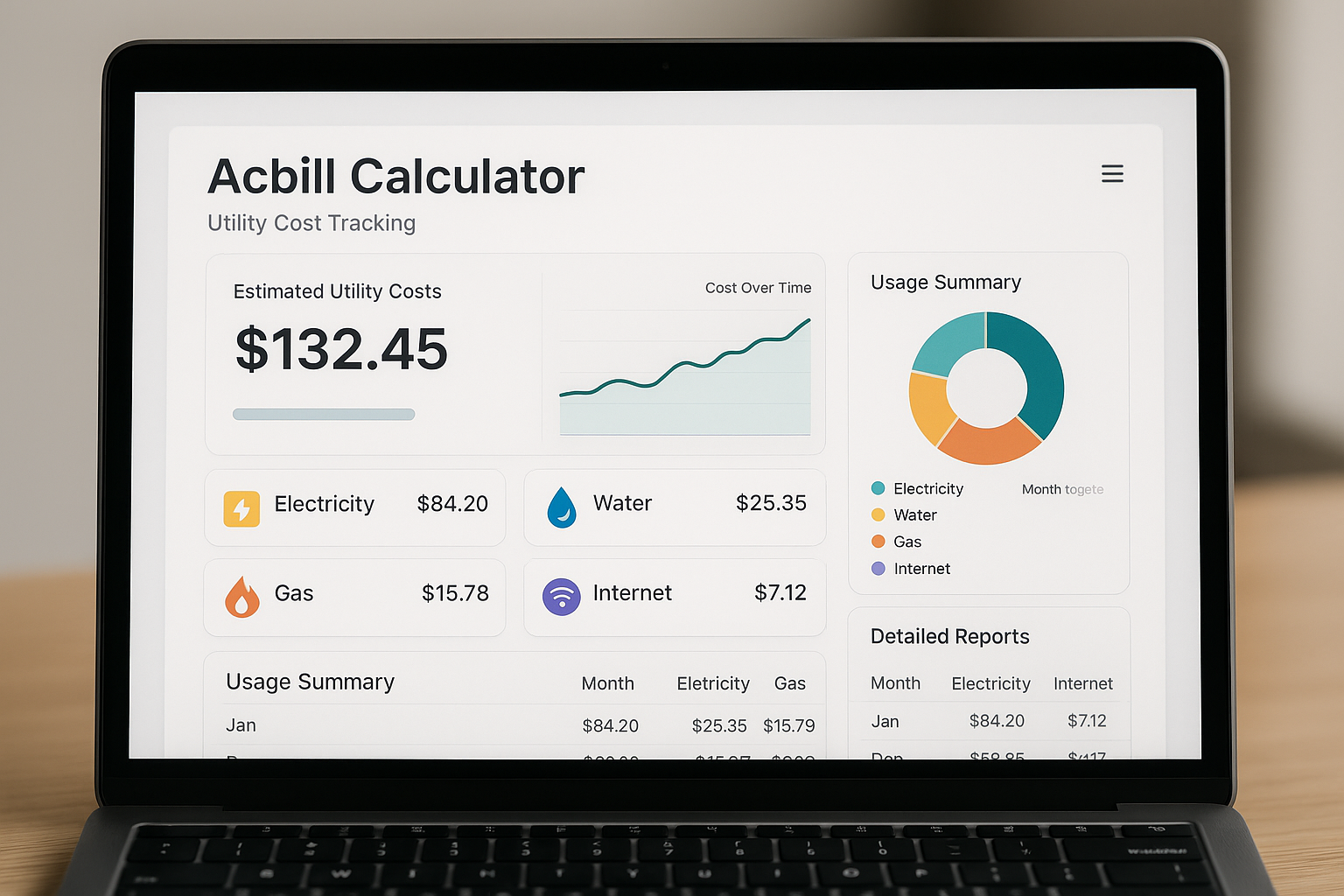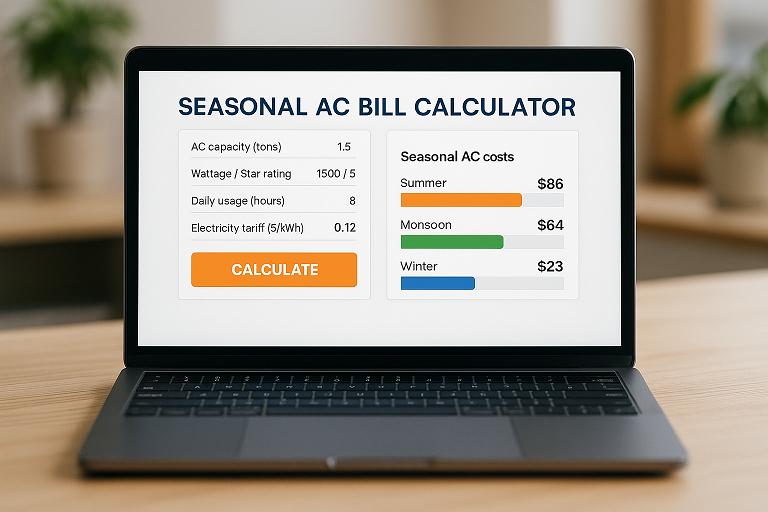
Seasonal AC Bill Calculator: Save Big on Summer, Monsoon & Winter Bills
Introduction to Seasonal AC Bill Calculator
If you're surprised by your air conditioner bill at the end of the month, you're not alone. Cooling bills often vary greatly between summer, monsoon, and winter. This is where the seasonal AC bill calculator comes in handy. It lets you calculate your AC's electricity usage and cost based on seasonal differences.
Unlike typical calculators that only consider wattage and hours of use, this tool takes into account degree days, humidity levels, and maintenance schedules for greater accuracy. Whether you're a homeowner or a business owner, understanding your seasonal AC costs can help you budget for them better and save on unnecessary expenses.
Why Your AC Bill Changes Every Season
Ever wondered why an AC bill is so high in May, but so low during January? This is due to weather conditions, humidity and the cooling demand itself.
Role of Degree Days in Energy Consumption
To help determine the amount of cooling your home requires, air conditioning experts use a measurement called Cooling Degree Day (CDD). Simply put, the hotter the outside temperature is compared to a baseline (usually 24degC or 75degF), the more energy that your AC draws.
Impact of Humidity on Cooling Efficiency
In monsoon, your AC works harder not only to cool the air but to expel surplus moisture from the air as well. This double workload means increased energy consumption even if the temperature is not extreme.
Seasonal Usage Patterns and Costs
- Summer: High demand resulting from outdoor temperatures
- Monsoon - Additional energy used to control humidity
- Winter: Requires very little refrigeration, bills are low.
How the Seasonal AC Bill Calculator Works
The seasonal AC bill calculator simplifies complex formulas into user-friendly inputs.
Input Parameters You Need to Enter
- AC capacity (tonnage)
- Wattage / Star rating
- Daily usage (hours)
- Local electricity tariff
- time period and average temperature/humidit
Behind the Formula: Cooling Load & Energy Units
The calculator estimates:
Energy Units (kWh) = (AC Wattage × Usage Hours × Days) ÷ 1000
Cost = Units × Electricity Tariff
It then factors in degree days and humidity modifiers to get it right seasonally.
Accuracy vs. Real-Life Fluctuations
No calculator is 100% accurate so this tool is accurate around 90-95%. Power surges, poor maintenance or extreme weather can still impact your bill.
Seasonal AC Cost Comparison
Summer AC Bill Calculation
Summer's endless need for cooling and high temperatures test your AC to its capacity. Bills will be up 30-50% from other seasons.
Monsoon AC Bill Calculation
You may have to run your AC compressor for longer because of the humidity even when the outdoor air is colder. This results in somewhat high bills.
Winter AC Bill Calculation
Low cooling load results in smallest seasonal bills. During this period, many households even turn off AC altogether.
Factors That Influence AC Bills Across Seasons
Room Size and Insulation Quality
Larger rooms that aren't well insulated means your AC is taking longer to cool them, which means more consumption.
AC Star Rating and Efficiency
A 5 star AC is 30% more energy efficient than a 2 star AC.
Maintenance and Filter Cleaning
Dirty filters and coils are less efficient - by 10-15%, which then increases your bill.
Tips to Reduce Seasonal AC Bills
Smart Thermostat & Automation
Using a smart thermostat allows you to control temperature according to time of day and occupancy to save energy.
Regular Seasonal Maintenance
Plan maintenance before the summer and the monsoon. Cleaning filters, checking refrigerant levels, and cleaning coils for dirt.
Energy-Saving Cooling Habits
- Set thermostat between 24–26°C.
- Circulate air with ceiling fans.
- Close leaks in the seal and close the curtains in order to reduce the heat load.
External Resource: Understanding Degree Days
Interested in more information on degree days? See the U.S. Energy Information Administration guide on degree days - it talks about their impact on heating and cooling expenses.
FAQs on Seasonal AC Bill Calculator
1.To what extent is seasonal AC bill calculator accurate?
It provides estimates of 90-95 percent including degree days and humidity.
2.Is it applicable to split and window ACs?
Yes, it is compatible with any type of AC, you just need to know the wattage or the star rating.
3.Is humidity a factor in increased AC bills?
Absolutely. Monsoon weather causes your AC to operate more, increasing bills because of high humidity.
4.Why does my AC bill go up during monsoon months compared to summer months?
Although temperature is lower, humid conditions cause the AC to struggle to dehumidify the air.
5.Is it true that maintenance is able to reduce seasonal bills?
Yes, energy use can be reduced by 15 percent using clean filters and coils.
6.Does the calculator apply to commercial buildings?
Definitely. Seasonal estimation of bills is beneficiary in offices, malls and hotels.
Conclusion: Make Smarter Seasonal AC Choices
You don't have to make any educated guesses using the Seasonal AC Bill Calculator. It can help you estimate your costs by taking into account degree days, humidity, and maintenance methods. Combine this with energy-saving routines and regular fall cleaning, and you'll save a lot of money on your AC bill.
Seasonal AC Bill Calculator: Save Big on Summer, Monsoon & Winter Bills
Introduction to Seasonal AC Bill Calculator
If you're surprised by your air conditioner bill at the end of the month, you're not alone. Cooling bills often vary greatly between summer, monsoon, and winter. This is where the seasonal AC bill calculator comes in handy. It lets you calculate your AC's electricity usage and cost based on seasonal differences.
Unlike typical calculators that only consider wattage and hours of use, this tool takes into account degree days, humidity levels, and maintenance schedules for greater accuracy. Whether you're a homeowner or a business owner, understanding your seasonal AC costs can help you budget for them better and save on unnecessary expenses.
Why Your AC Bill Changes Every Season
Ever wondered why an AC bill is so high in May, but so low during January? This is due to weather conditions, humidity and the cooling demand itself.
Role of Degree Days in Energy Consumption
To help determine the amount of cooling your home requires, air conditioning experts use a measurement called Cooling Degree Day (CDD). Simply put, the hotter the outside temperature is compared to a baseline (usually 24degC or 75degF), the more energy that your AC draws.
Impact of Humidity on Cooling Efficiency
In monsoon, your AC works harder not only to cool the air but to expel surplus moisture from the air as well. This double workload means increased energy consumption even if the temperature is not extreme.
Seasonal Usage Patterns and Costs
- Summer: High demand resulting from outdoor temperatures
- Monsoon - Additional energy used to control humidity
- Winter: Requires very little refrigeration, bills are low.
How the Seasonal AC Bill Calculator Works
The seasonal AC bill calculator simplifies complex formulas into user-friendly inputs.
Input Parameters You Need to Enter
- AC capacity (tonnage)
- Wattage / Star rating
- Daily usage (hours)
- Local electricity tariff
- time period and average temperature/humidit
Behind the Formula: Cooling Load & Energy Units
The calculator estimates:
Energy Units (kWh) = (AC Wattage × Usage Hours × Days) ÷ 1000
Cost = Units × Electricity Tariff
It then factors in degree days and humidity modifiers to get it right seasonally.
Accuracy vs. Real-Life Fluctuations
No calculator is 100% accurate so this tool is accurate around 90-95%. Power surges, poor maintenance or extreme weather can still impact your bill.
Seasonal AC Cost Comparison
Summer AC Bill Calculation
Summer's endless need for cooling and high temperatures test your AC to its capacity. Bills will be up 30-50% from other seasons.
Monsoon AC Bill Calculation
You may have to run your AC compressor for longer because of the humidity even when the outdoor air is colder. This results in somewhat high bills.
Winter AC Bill Calculation
Low cooling load results in smallest seasonal bills. During this period, many households even turn off AC altogether.
Factors That Influence AC Bills Across Seasons
Room Size and Insulation Quality
Larger rooms that aren't well insulated means your AC is taking longer to cool them, which means more consumption.
AC Star Rating and Efficiency
A 5 star AC is 30% more energy efficient than a 2 star AC.
Maintenance and Filter Cleaning
Dirty filters and coils are less efficient - by 10-15%, which then increases your bill.
Tips to Reduce Seasonal AC Bills
Smart Thermostat & Automation
Using a smart thermostat allows you to control temperature according to time of day and occupancy to save energy.
Regular Seasonal Maintenance
Plan maintenance before the summer and the monsoon. Cleaning filters, checking refrigerant levels, and cleaning coils for dirt.
Energy-Saving Cooling Habits
- Set thermostat between 24–26°C.
- Circulate air with ceiling fans.
- Close leaks in the seal and close the curtains in order to reduce the heat load.
External Resource: Understanding Degree Days
Interested in more information on degree days? See the U.S. Energy Information Administration guide on degree days - it talks about their impact on heating and cooling expenses.
FAQs on Seasonal AC Bill Calculator
1.To what extent is seasonal AC bill calculator accurate?
It provides estimates of 90-95 percent including degree days and humidity.
2.Is it applicable to split and window ACs?
Yes, it is compatible with any type of AC, you just need to know the wattage or the star rating.
3.Is humidity a factor in increased AC bills?
Absolutely. Monsoon weather causes your AC to operate more, increasing bills because of high humidity.
4.Why does my AC bill go up during monsoon months compared to summer months?
Although temperature is lower, humid conditions cause the AC to struggle to dehumidify the air.
5.Is it true that maintenance is able to reduce seasonal bills?
Yes, energy use can be reduced by 15 percent using clean filters and coils.
6.Does the calculator apply to commercial buildings?
Definitely. Seasonal estimation of bills is beneficiary in offices, malls and hotels.
Conclusion: Make Smarter Seasonal AC Choices
You don't have to make any educated guesses using the Seasonal AC Bill Calculator. It can help you estimate your costs by taking into account degree days, humidity, and maintenance methods. Combine this with energy-saving routines and regular fall cleaning, and you'll save a lot of money on your AC bill.
